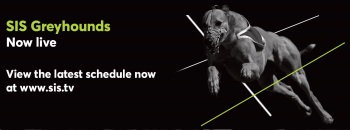1927 June 20 Britain’s second track, White City (London) stage their first greyhound meeting. It was built to stage the 1908 Olympic Games and was opened by King Edward VII. The first race on the eight-race card is a veterans race “for six greyhounds that ran last season at Manchester”. The event was worth £15 to the winner and was won by Charlie Cranston in 30.86 for the 525 yards. The eight race card includes an event for unraced dogs plus three events over hurdles. Also running on the same card, but narrowly beaten, was the dog destined to win the first Greyhound Derby, Entry Badge.
1971 Despite a visit from NGRC Secretary Fred Underhill and steward Ken Guy, Yarmouth promoter Len Franklin has turned down the opportunity to switch his track from independent to NGRC racing. He states: “Local owners cannot be expected to pay a £15 a year licence fee to race one £50 dog” (Index linked to £195 and £650 respectively).

1985 Wembley racing manager Ron Fraser retires after 13 years in charge. He will be replaced by his assistant, Jim Cremin (Pictured).
1991 A Romford owner bought a greyhound purely because he liked its name and so he could – as he did – phone the racing office and ask “Excuse me, is Bugs Bunny trialling today?”
1993 BAGS threaten to sue the bookmakers who fail to pay for the BAGS service (£517 p.a. provincial, £693 p.a. Greater London). The organisation reckon 20% of all betting shops are non-payers and almost all are member of the British Betting Office Association (BBOA), whose chairman Warwick Bartlett has regularly boasted his refusal to pay into the voluntary BGRF.
1991 Hove lose a court battle with Alliance an Leicester Building Society which will allow the latter to reclaim land on which the Orchard Road Stand is located. Meanwhile Hove’s parent company Coral is put on the market by its owners, Bass.
1973 Two qualifying rounds are required to bring the number of first round entries down to 48. Six fastest from first qualifying round: 28.80-Suburban Gent, 28.90-Patricia’s Hope, 28.94-Lighthouse Boy, Miss Ross, 28.95-Carry On Bimbo, 28.96-Cash On Demand. Six fastest from second qualifying round: 28.43-Say Little, 28.67-Mels Pupil, 28.74-Pets First, 28.81-Suburban Gent, 28.84-Moordyke Ringo, 28.92 Fly Dazzler. Quickest of the first session, Dunmore Spring Cup winner Suburban Gent, suffered a career ending shoulder injury in the first round.
1961 The English Derby gets underway looking to finalise the remaining 12 runners for the first round. The Racing Manager has already allocated the first 36 runners. With only eight races allowed by law, the track stage three afternoon trials (no betting) and eight qualifying heats later the same day. The eleven winners and the fastest second are due to go through and a number of fancied dogs are eliminated. Among the dozen who make it are Clopook, trained by young private trainer Ernie Gaskin. The fastest runner-up Winter Bell (200-1 ante post) clocks a calculated 29.36 – faster than several heat winners. Both runners go on to reach the final.
2010 Would-be Coventry promoter Martyn Dore pulls out of the deal blaming the GBGB for lack of support. The Board respond that they had not been given adequate assurances in relation to Dore’s long term security at the stadium.
1996 Bookie Douggie Tyler celebrates 50 years standing at Walthamstow.
2010 Following a ‘strategic review’ Stephen Rea departs as Hall Green General Manager after 12 years in charge. He will be retained on a consultancy basis by GRA. He is followed within a month by Perry Barr boss Carol Chown-Smith.
1991 In a statement to a committee of MPs, BAGS spokesman Tom Kelly divulges that Hackney is paid £4,000 per meeting, or £400 per race (if televised on SIS the figure was £4,900). He also agrees that the average betting shop turnover per race was around £200,000. Referring to the £900 broadcasting bonus, David Sumberg, the Tory MP for Bury said: “This £900 bugs me, it is so small. Kelly responded “That is the fee which is paid by BAGS to SIS. The tracks are satisfied with the fee they are getting. That is why there have been 22 applications from tracks for contracts this year.” That number could rise to 23 with Walthamstow admitting that they will apply for the following year for the first time.
2000 Swindon submit plans to the local council for a new stadium to be located alongside a David Lloyd Tennis Centre.
1950 The final of the London Cup at Clapton will be preceded by a display by three Alsatian war dogs. In addition to obedience work they will jump through hoops, run through a tunnel of fire, and remove items of clothing from ‘dead’ soldiers.
1959 The owners of Merry May announce that their ex-Hove racer has finally succumbed to old age. Reckoned to have been the country’s oldest greyhound she was 17 years and one month old.
1971 The remains of a bitch who escaped from Douglas Tucker’s kennel at Winterbourne is found with her legs tied together on a railway line. Police are pursuing enquiries based on a theory that the bitch had been killing chickens and their breeder had taken his revenge.
2011 The BGRF announce that following a surprise upturn in greyhound betting starting in late 2010, they expect to have an extra £2m in their coffers during the current year.
1961 One of the greatest sires of all time, Champion Prince dies at owner Dan Maher’s kennel in Tipperary, a month short of his 12th birthday. Bred by Joe Fitzpatrick of Templemore, Maher bought the dog (and his amazing sister Vandado) for £100 after a trial at Thurles. He went on to break 30.00 nine times. Among his progeny were English Derby winners Pigalle Wonder and The Grand Canal, Irish Derby winner Sir Frederick, and Waterloo Cup winner Old Kentucky Minstrel – plus Prince Of Bermuda, Duet Leader, Northern King etc. Prince is buried under an apple tree in Maher’s back garden.

1950 Ballymac Ball wins the English Derby at the second attempt – he was favourite for the 1949 final but was eliminated in the first round. Owned by Northern Irish bookie Tom Nicholl, and just three months short of his fourth birthday, Ball has been expertly handled by Stan Martin. A crowd of 50,000 saw the 7-2 chance lead from trap to line to clock the fastest ever Derby win, 28.72. The final is Ball’s 19th win in 21 races for the Wimbledon trainer. His victories also include the International, Laurels and Spring Cup. He is the 500 yard record holder at Southend and Wimbledon and the national record holder for 550 yards (White City). Incidentally, Ball is the 14th brindle to have won the Derby. There have been five fawns, but only one black to date, Davesland.














